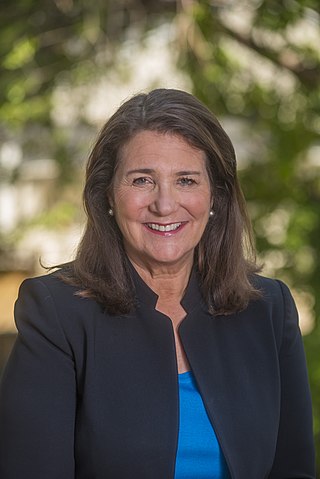In United States government, the line-item veto, or partial veto, is the power of an executive authority to nullify or cancel specific provisions of a bill, usually a budget appropriations bill, without vetoing the entire legislative package. The line-item vetoes are usually subject to the possibility of legislative override as are traditional vetoes.
A pocket veto is a legislative maneuver that allows a president or other official with veto power to exercise that power over a bill by taking no action, thus effectively killing the bill without affirmatively vetoing it. This depends on the laws of each country; the common alternative is that if the president takes no action a bill automatically becomes law.

Olympia Jean Snowe is an American businesswoman and politician who was a United States Senator from Maine from 1995 to 2013. Snowe, a member of the Republican Party, became known for her ability to influence the outcome of close votes, including whether to end filibusters. In 2006, she was named one of America's Best Senators by Time magazine. Throughout her Senate career, she was considered one of the most moderate members of the chamber.

Diana Louise DeGette is an American lawyer and politician serving as the U.S. representative for Colorado's 1st congressional district since 1997. A member of the Democratic Party, her district is based in Denver. DeGette was a Chief Deputy Whip from 2005 to 2019 and is the dean of Colorado's congressional delegation; she served as the Colorado State Representative for the 6th district from 1993 until her election to the U.S. House.

The Children's Health Insurance Program (CHIP) – formerly known as the State Children's Health Insurance Program (SCHIP) – is a program administered by the United States Department of Health and Human Services that provides matching funds to states for health insurance to families with children. The program was designed to cover uninsured children in families with incomes that are modest but too high to qualify for Medicaid. The program was passed into law as part of the Balanced Budget Act of 1997, and the statutory authority for CHIP is under title XXI of the Social Security Act.
The stem cell controversy is the consideration of the ethics of research involving the development and use of human embryos. Most commonly, this controversy focuses on embryonic stem cells. Not all stem cell research involves human embryos. For example, adult stem cells, amniotic stem cells, and induced pluripotent stem cells do not involve creating, using, or destroying human embryos, and thus are minimally, if at all, controversial. Many less controversial sources of acquiring stem cells include using cells from the umbilical cord, breast milk, and bone marrow, which are not pluripotent.

James Matthes Talent is an American politician who was a U.S. Senator from Missouri from 2002 to 2007. He is a Republican and resided in the St. Louis area while serving in elected office.

The 100-Hour Plan was a United States Democratic Party political strategy detailing the actions the party pursued upon assuming leadership of the 110th Congress on January 4, 2007. The strategy was announced before the 2006 midterm elections. Speaker Nancy Pelosi pledged that her party would continue to pursue these goals upon her assumption of leadership. The 100-hour time period refers to business hours and not actual time, and has alternately been termed "100 legislative hours"; Pelosi's spokesman Brendan Daly defined the starting point this way: "It's when the House convenes, after the one-minutes and before the special orders."

The U.S. Troop Readiness, Veterans' Care, Katrina Recovery, and Iraq Accountability Appropriations Act, 2007,, is an emergency appropriations act passed by the 110th United States Congress that provides funding for the Iraq War through September 30, 2007. A prior version of the act, H.R. 1591, included a timeline for withdrawal of U.S. troops from Iraq. H.R. 1591 was passed by Congress but vetoed by President George W. Bush. While the veto of H.R. 1591 could have caused delays for Iraq war expenditures, the availability of funds resulting from the passage of the Defense Appropriations Act on September 29, 2006, allowed the Department of Defense to continue Iraq War spending in the interim period between the veto of H.R. 1591 and the President's signature of approval for H.R. 2206. The Feed and Forage Act was not invoked by the U.S. government in the days prior to the passage of H.R. 2206.
The Iran Sanctions Enhancement Act of 2007, introduced in the United States House of Representatives by Representative Mark Kirk (R-IL) and Representative Rob Andrews (D-NJ), would have threatened sanctions against any company or individual that provided Iran with refined petroleum products or engages in an activity that could contribute to the enhancement of Iran's ability to import refined products after December 31, 2007. The bill was never voted on and died in committee.

Frederick Carlyle Boucher is an American politician who was the U.S. representative for Virginia's 9th congressional district from 1983 to 2011. He is a member of the Democratic Party. He was defeated in his bid for a 15th term by Republican Morgan Griffith in the 2010 elections.
Stem cell laws are the law rules, and policy governance concerning the sources, research, and uses in treatment of stem cells in humans. These laws have been the source of much controversy and vary significantly by country. In the European Union, stem cell research using the human embryo is permitted in Sweden, Spain, Finland, Belgium, Greece, Britain, Denmark and the Netherlands; however, it is illegal in Germany, Austria, Ireland, Italy, and Portugal. The issue has similarly divided the United States, with several states enforcing a complete ban and others giving support. Elsewhere, Japan, India, Iran, Israel, South Korea, China, and Australia are supportive. However, New Zealand, most of Africa, and most of South America are restrictive.
Stem cell laws and policy in the United States have had a complicated legal and political history.
Laurie Strongin is an American author and medical research campaigner.

The Medicare Improvements for Patients and Providers Act of 2008 ("MIPPA"), is a 2008 statute of United States Federal legislation which amends the Social Security Act.
The Truth in Caller ID Act of 2009 is an Act of the United States Congress that generally makes it illegal to use false Caller ID information for a call with the intent to defraud or scam a called party. The Act makes exceptions for certain law-enforcement purposes. Callers are also still allowed to preserve their anonymity by choosing to block all outgoing caller ID information on their phone lines. Caller ID spoofing is generally illegal in the United States if done "with the intent to defraud, cause harm, or wrongfully obtain anything of value"

The William M. (Mac) Thornberry National Defense Authorization Act for Fiscal Year 2021 is a United States federal law which specifies the budget, expenditures and policies of the U.S. Department of Defense (DOD) for fiscal year 2021. Analogous NDAAs have been passed annually for 59 years. The act is named in honor of Representative Mac Thornberry, who served as either the chair or the ranking member of the House Armed Services Committee. Thornberry retired from Congress at the end of the congressional session.






